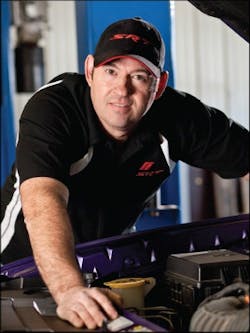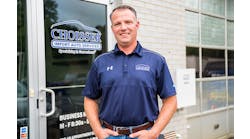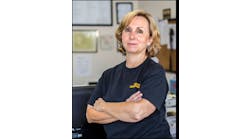By some measures, the trend of do-it-yourself auto repairs is at an all-time high, with more than 90 percent of shadetree mechanics saying they would continue to do the work themselves even if their financial situation improved significantly, according to a report conducted by AutoPartsWarehouse. Eighty percent of the study’s respondents added that easy online access to parts makes them even more likely to do it themselves, not to mention the increased prevalence of videos on YouTube demonstrating projects of all kinds.
What does this mean for the future of the auto service industry? In the eyes of John Pennella, owner of a new do-it-yourself auto garage in Wichita, Kan., these trends are a business opportunity to provide DIY mechanics with commercial-grade spaces for performing their own repairs in the comfort of an actual shop—for a fee, of course.
Plainly enough, Pennella’s DIY outfit is called Auto Shop DIY, and it’s a business-within-a-business separate from his other operation, The Garage, which is a three-bay service shop he started in 2005.
While attracting do-it-yourself mechanics on the scale he originally envisioned has been challenging, the Auto Shop DIY’s business is gaining traction, and leading its owner to think of new ways to lease his shop’s time and equipment with less overhead than traditional, full-service centers.
“I’m not getting any younger, so it’s a way of creating a low-overhead facility with very minimal employees to manage,” he says. “There’s not a lot of money on the rent side of it, but there are [ways] to generate additional revenue.”
The Auto Shop DIY
After launching The Garage in 2005, Pennella purchased a three-building property where he moved the operation—initially a car wash, lube and service center—in late 2009. Then, within the past year, he closed the low-margin lube portion of the business and dedicated 3,000 square feet of the space to Auto Shop DIY, designed to deliver higher margins with dramatically less overhead than a traditional repair center.
The Garage
Wichita, Kan.
Shop size: 3,000 square feet
Staff size: 4
Monthly car count: 160
Average repair order: $260
It was an idea he first got from visiting his sister and her husband stationed at the Fort Sill United States Army post in southwestern Oklahoma. On base, there was a hobby shop space where active or retired personnel could work on their own vehicles, with all of the tools needed for common tasks.
As a private pilot, Pennella also had experience with pilot-assisted maintenance, where owners can work on their own planes with the option of assistance from a trained aircraft mechanic.
Putting two and two together, he hatched a plan to turn over four bays of The Garage’s space to cultivate a do-it-yourself audience in his city of Wichita, a growing metro area with nearly 400,000 residents.
“For the most part, a lube center requires personnel, and personnel are expensive,” Pennella says. “The lube center was no longer creating the kind of income I would have liked, so I started thinking about how I could do something a little different.”
The vision was to provide at-home mechanics with a climate-controlled indoor garage space, a 10,000-pound lift, basic hand tools, a laptop computer, six-inch vice, stool and access to the air compressor for an hourly rate of $29.99.
Additional charges are accrued for specialty equipment, like the shop’s hydraulic press, transmission jack or pneumatic tools. If a customer becomes stumped during the repair, Pennella has dedicated—technically, leased—one of his technicians to assist stymied do-it-yourselfers, which is a key revenue stream envisioned in Auto Shop’s business plan.
Whereas labor goes for $90 an hour at The Garage, Auto Shop DIY customers can receive an hour of assistance for $49.99, with a one-hour minimum, in addition to the $29.99 base hourly rate. The labor rate is discounted to reflect that base rate, and also as a perk for DIY customers to have confidence they won’t get hopelessly bogged down during a difficult repair.
Pennella envisioned customers undertaking more complicated projects than oil changes, which are hard to justify at the hourly rate, and needing an hour or two of technician assistance along the way. So far, during its half-year existence, Pennella has seen everything from brake jobs up to clutch replacements and full engine rebuilds undertaken in Auto Shop DIY’s repair bays.
Average projects last anywhere from two to five hours. If a customer is unable to finish a repair project by the end of the day, most typically 10 p.m., they are not charged an overnight storage fee, but the clock resumes running at 8 a.m. the next morning, providing users with adequate incentive to move quickly.
A Complex Proposition
Rather than taking away potential customers from The Garage, Pennella sees his Auto Shop DIY venture as a way to capture customers his business previously would never have seen: tried-and-true do-it-yourselfers and, specifically, those looking to do their own repairs in a cleaner, more spacious facility than they have available at their home garage, or that of a friend or relative.
“If you’re a true do-it-yourselfer, your car probably never gets into an automotive facility,” he says. “That’s the business I’m going after—the person that doesn’t have a way to put [their vehicle] up in the air, but would figure out some way to do it. This is a safer, easier way for the do-it-yourselfer to get the work done.”
While word of mouth is growing, and the area’s early adopters and other shop owners have expressed unbridled enthusiasm for the concept, Pennella has yet to see the amount of business forecasted, especially after The Garage’s successful launch a decade ago.
Combining the four Auto Shop DIY bays, open seven days a week, the business has 340 available hours for sale in a given week and, currently has been selling approximately 30 hours of that time—less than 10 percent of the available slots.
He expected a larger boost after summer, when the heated space is a larger draw and he has seen bookings increase, partially because of word-of-mouth recommendations. Filling 100 percent of the available time is unlikely in the near future, but Pennella would like to see $200 per day for each bay, which is approximately seven hours of DIY service.
He expects to reach, then exceed, that level sometime in 2015. For its first full year, Pennella projects $300,000 in revenue from the Auto Shop DIY segment.
“I’m very optimistic because the people I talk to at car shows, everyone I talk to thinks it’s an awesome idea,” he says. “The difficulty has been, how do you get that—‘It’s an awesome idea’—to them booking the time and doing [their next project] in the bay.”
Building Awareness
Search online for “do-it-yourself auto repair” and you’ll find nationwide locations offering such services, including advice on how to open your own DIY repair shop, yet the concept is still new in many markets.
To build awareness for Auto Shop DIY, Pennella printed brochures that he’s handed out at racetracks, car shows and with vendors, and he also purchased radio and electronic billboard advertising in the area.
As recognition has grown, Pennella has seen a marked increase in new customers referred from friends or family who have used the Auto Shop. It’s a welcome trend, he says, as aggressive initial marketing has significantly increased expenses for the fledgling business.
One of the challenges of marketing a relatively new business type, he says, is the specific niche of people the business is chasing—do-it-yourself mechanics looking to do jobs more complex than oil changes, yet lacking adequate garage space or tools.
“It’s not designed for the average guy doing an oil change, because I can’t figure out a way to cut the price for such a small job,” Pennella says. “Today’s cars have all these shields that you have to remove …[and] you find out real quick, getting a car in and out in a half hour is pretty tough to do.”
Another challenge, which he has considered as the ramp-up period, has fallen short of expectations, is that Wichita may not be the ideal urban environment for a do-it-yourself shop.
“Where we’re located makes my situation a little bit more difficult,” he says. “I think it will work here, but it’s just going to take a little bit of time to catch on.”
Two Businesses Shaking Hands
With two businesses sharing the same space but kept separate for insurance reasons unique to his situation, Pennella sees each shaking hands with the other. Customers familiar with The Garage have rented space in Auto Shop DIY for repairs they would rather do themselves, while those new to the Auto Shop DIY have brought projects into The Garage after a favorable do-it-yourself experience.
“Part of it is [Auto Shop DIY customers saying], ‘If I’m going to have to take it to a shop because I can’t do it, I’d rather take it to somebody who’s looking out for me on the other side,’” he says. “It’s a shaking of hands both ways.”
In addition, he has seen positive reviews on Auto Shop DIY’s Facebook page, which contains compliments about the clean, safe environment, the prices, solid customer service and ease of reserving time online.
“As a business owner with a [traditional] repair facility, you can’t get people to even go to your Facebook page, let alone write nice reviews of how excited they were about your repair job,” Pennella says. “They go on [the Auto Shop DIY’s] Facebook, post pictures and are just excited about it.”
With a still-exciting idea that has underperformed in its first six months, Pennella is considering making some changes to appeal to local technicians who aspire to someday open their own service center.
“Being a technician all my life and trying to start up my own business, it’s a struggle,” he says. “I thought, what a great thing, had I had this opportunity when I was wrenching and wanting to venture out on my own.”
While the details of this possible metamorphosis are still in flux, he thinks like-minded technicians could use his DIY space to get their customer base in place with much lower overhead than renting a brick-and-mortar space or doing mobile service.
Marketing, he says, would be the hard part—specifically attracting the attention of ambitious technicians looking to build a business, but leery about leasing a brick-and-mortar space or sinking money into venturing into mobile service.
“This is the way I see things going for the future,” Pennella says. “How do you go about it? That's another story, and I don’t know yet.”



